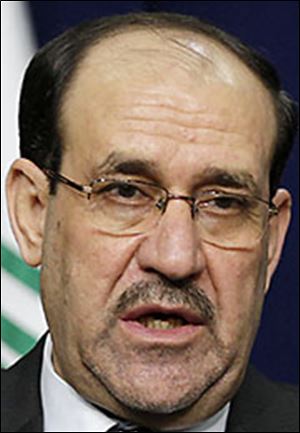
EDITORIAL
Fighting for Iraq
1/13/2014
al-Maliki
The conflict in Iraq is intensifying into near-civil war, as efforts increase to draw the United States back in.
The sources of internal warfare in Iraq largely derive from the country’s diverse population of Shiite Muslims, Sunni Muslims, Kurds, Christians, Jews, and other sects. From the time Iraq gained independence in 1932 until the U.S. invasion in 2003, minority Sunnis ruled uneasily, using brutal methods under Saddam Hussein to retain their position on top of the heap.
After U.S. forces deposed Saddam and the Sunnis, the Shiite majority gained control through elections. But Prime Minister Nouri al-Maliki did not have the sense to include Sunnis in his government, and they are rebelling. The other element in the Iraqi political-military equation is the religiously reactionary, militantly Islamist al-Qaeda.
Although President George W. Bush used a fictitious al-Qaeda presence in Iraq as one of the bases for the 2003 invasion, the terror group is now a real, and active, participant in the current conflict. It has exploited Mr. al-Maliki’s exclusion of Sunnis from government and the civil war in neighboring Syria to consolidate its power in Iraq. The governments of both Saddam and Syrian President Bashar Assad and his father blocked al-Qaeda involvement in their countries.
The battle for control of Iraq’s government includes Kurds who have firm control of the north of the country. The other parties are the Shiite government of Mr. al-Maliki, increasingly radical Islamist Sunni militias that include Iraqi and foreign elements, and more-traditional Sunnis whom Americans previously recruited to fight radical Sunnis.
The United States is increasing arms sales to the al-Maliki government to help it resist al-Qaeda and other enemies. Traditional Sunnis are allied with the Shiite government against radical Sunnis, although this combination may not last.
President Obama has resisted providing more-substantial military aid — including troops — to try to save Mr. al-Maliki’s regime, a position reiterated recently by Secretary of State John Kerry. That stance is correct, based on the complexity of the situation in Iraq, America’s more-urgent priorities, and the need for Iraqis to work out their own destiny.